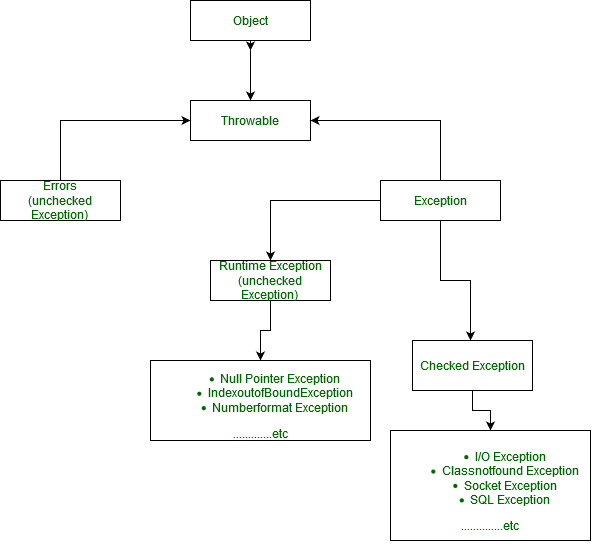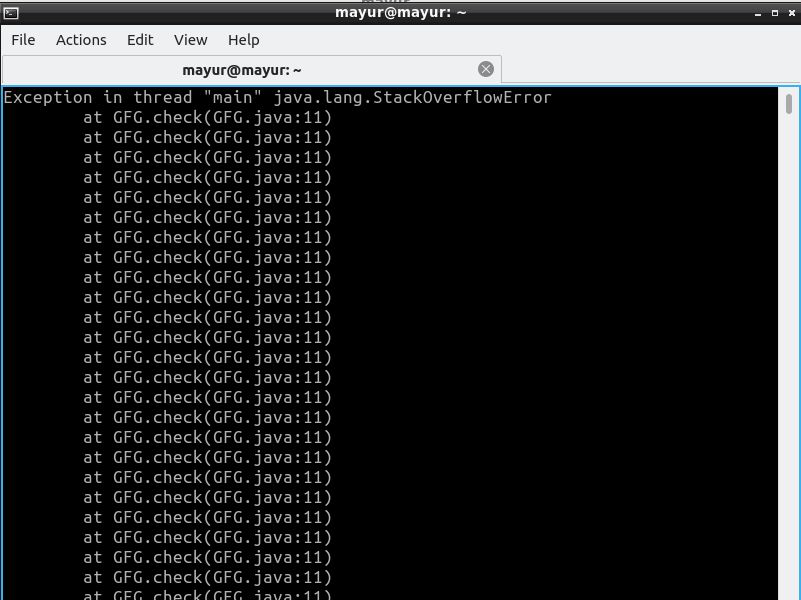Java Program to Handle the Exception Hierarchies
Last Updated :
16 Jun, 2021
Exceptions are the events that occur due to the programmer error or machine error which causes a disturbance in the normal flow of execution of the program and terminates the program.
Exception Handling: The process of dealing with exceptions is known as Exception Handling.
Hierarchy of Exceptions: Object class is the parent class of all the classes of java and all the errors or Exceptions objects inherited by throwable class. The throwable class has two subclass Errors and Exception.

Errors Class: This Class contains those errors which are difficult to handle. They occur during runtime of a program For e.g. StackOverflowError, OutOfMemoryError etc.
- StackOverflowError: This error occurs due to an inbound condition in the recursion and using an infinite loop in a program. This cause exceeds the stack memory and causes StackOverflowError in the program.
StackOverflowError:
Java
import java.io.*;
class GFG {
static void check(int n)
{
if (n == 0) {
return;
}
check(n + 1);
}
public static void main(String[] args) { check(3); }
}
|

Exception class:
This class contains all the exceptions that can be handled easily There are two subclasses inherited it one is Runtime Exception(unchecked Exception) and checked Exception.
1.Checked exceptions: These exceptions are the subclass of the Exception class. These types of exceptions occur during the compile time of the program by the javac. These exceptions can be handled by the try-catch block otherwise the program will give a compilation error. ClassNotFoundException, IOException, SQLException etc are the examples of the checked exceptions.
I/O Exception: This Program throw I/O exception because of due FileNotFoundException is a checked exception in Java. Anytime, we want to read a file from the filesystem, Java forces us to handle error situations where the file is not present in the given location.
Assumption: consider myfile.txt file does not exit
Implementation:
Java
import java.io.*;
class GFG {
public static void main(String args[])
{
try {
FileInputStream GFG
= new FileInputStream("C:/myfile.txt");
}
catch (Exception e) {
System.out.println("File not found");
}
}
}
|
2. Unchecked Exception:
These types of exceptions occur during the runtime of the program. These are the exceptions that are not checked at a compiled time by the compiler. In Java exceptions under Error and RuntimeException classes are unchecked exceptions, This Exception occurs due to bad programming. Runtime Exceptions like IndexoutOfBoundException, Nullpointer Exception, etc can be handled with the help of Try-Catch Block
(Array)IndexoutOfBoundException: This Exception occurs due to accessing the index greater than and equal to the size of the array length. The program will automatically be terminated after this exception.
Implementation:
Java
import java.io.*;
class GFG {
public static void main(String[] args)
{
int a[] = { 1, 2, 3, 4, 5 };
try {
System.out.println(
a[5]);
}
catch (ArrayIndexOutOfBoundsException e) {
System.out.println(
"Out of index please check your code");
}
}
}
|
Output
Out of index please check your code
Multiple Catch Blocks: Sometimes in a program particular code can throw multiple Exceptions object that can be handled using multiple catch blocks under a single try block
Format:
Java
try {
}
catch (ExceptionA e1) {
}
catch (ExceptionB e2) {
}
|
Handling ArithmeticException and IndexoutOfBound Exception using Multiple catch blocks.
Java
import java.io.*;
class GFG {
public static void main (String[] args) {
try {
int number[] = new int[10];
number[10] = 30 / 0;
} catch (ArithmeticException e) {
System.out.println("Zero cannot divide any number");
} catch (ArrayIndexOutOfBoundsException e) {
System.out.println("Index out of size of the array");
}
}
}
|
Output
Zero cannot divide any number
Like Article
Suggest improvement
Share your thoughts in the comments
Please Login to comment...